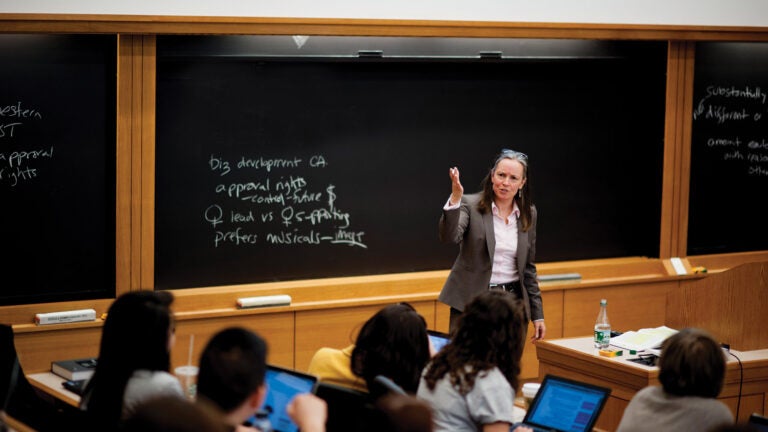
Ready to revamp tradition, a USC Gould professor champions legal accessibility and affordability. | PHOTO COURTESY OF USC GOULD SCHOOL OF LAW
A USC Gould Professor is Ready to Shake Up the Legal System
Gillian Hadfield champions legal accessibility and affordability.
The next time you need legal advice to, say, set up a business or learn your rights as an employee, could it be as easy as dropping by a Walmart or downloading an app on your smartphone?
Gillian Hadfield hopes so. The USC Gould School of Law professor of law and economics has an unconventional take on the American legal system: She envisions a new world in which lots of people and entities—not just lawyers and legal firms—could give people reliable, affordable help online or from convenient locations in their community.
Right now, there’s only one type of lawyer, and these lawyers shouldn’t run the equivalent of an in-and-out pharmacy clinic, Hadfield explains, but maybe someone should. Her book Rules for a Flat World explores ways to reinvent the legal system so it’s better suited to today’s demands.
Professionals in a new role—a “legal practitioner”— could provide straightforward legal guidance, and smartphone apps and other digital technologies could help low income and vulnerable groups get help at the touch of a button. Hadfield imagines taking a picture of a document, like a landlord-tenant agreement, and getting some basic information about it for as little as $5.
The real goal of the course is to get students thinking very differently about how they, as members of the legal community, can help change the ways things are done to help more people.
Gillian Hadfield
“It’s not rocket science,” she says. “The only thing that stands in the way of doing it is that you can’t form that company.”
In the U.S.—unlike countries in Europe—it’s currently illegal for attorneys to use outside capital to start a company. For example, a group of USC graduates could not launch a start-up in law unless they fully funded it themselves. “That’s the kicker,” Hadfield says.
And lawyers can’t simply lobby the legislature to revamp the system. They’re regulated by the courts, which can make changes difficult, she adds. “Mostly I’m optimistic. But I flip back and forth between saying it will never change to saying it has to change,” she says. She wrote her book to lay out her case and inform more people who aren’t lawyers about the concepts.
Some companies are attempting to bridge that gap, like LegalZoom, which offers access to legal services for about $35 a month. (Hadfield sits on LegalZoom’s advisory council.) The state of Washington recently debuted legal technicians who can counsel residents on issues such as divorce and child custody. And of course, the best agents of change are often the next generation of thinkers. Hadfield teaches the Legal Design Lab at USC Gould, which challenges students to find solutions to the legal system’s accessibility problems. In the lab, students learn about issues seen in practice, from large corporate clients that need to manage complex business relationships to people in developing countries that may have a corrupt or nonexistent legal system. Students develop ideas and eventually propose ways to deliver legal help.
“The real goal of the course is to get students thinking very differently about how they, as members of the legal community, can help change the ways things are done to help more people,” Hadfield says.
Learn more about the Legal Design Lab in this video.
